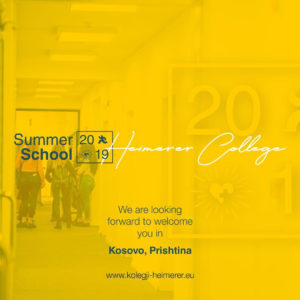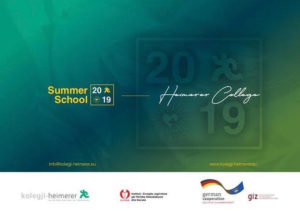Finished projects
1
2nd International Summer School- Migration and Multidisciplinary Approach
The 2nd International Summer School 2019 on “Migration and Health from a Multidisciplinary Approach” was jointly organized by Heimerer College (HC) and the Institute of Southeast Europe for Health and Social Policy (ISEE-HSP). It was partially financed by GIZ & DIMAK.
The event took place in Pristina, Kosovo (more specifically at Heimerer College) during the period of June 3 and June 8, 2019. Overall, the Summer School 2019 managed to gather around 30 students, out of which 20 were internationals while 10 of them were local students. International students arrived one day earlier, on 2nd of June 2019, and left on June 9, in order to have briefing and debriefing before and after the project.
The overall objective of the 2nd International Summer School 2018 was to gather scientists, practitioners, students, researchers who are actively working and studying fields related to migration and reintegration in combine with health, law, social work, governance, education etc. Moreover, the main purposes and goals of the summer school were to raise awareness amongst Kosovar students and those from abroad on the subject of migration – its implications and consequences; its potential opportunities (for countries of origin and destination – for instance through circular migration); and the need for an in-depth understanding of the phenomenon so as to manage it better and in a humane way. It also aimed to further:
- Raise encouragement of scientific research and exchange, as well as the emergence of evidence-based policies on migration;
- Wide dissemination of scientific knowledge/methods and summer school proceedings;
- Develop practical research projects carried out by the participants in their respective workgroups;
- Generate concept of ideas for projects in Health and Migration, through project-based learning, with a focus on circular migration;
- Bring together in Kosovo, students from a wide range of backgrounds in order to foster socio-cultural interaction and break down barriers and prejudices.
The program contained presentations by well known international professors and experts related to above mentioned fields. The subjects were discussed in a multidisciplinary approach, covering different but interrelated aspects such as, psychosocial impact, push and pull factors, health and migration, circular migration, economy and migration, challenges of integration and reintegration, the role of media, and development aspects and international governance mechanisms etc.
In addition to the lectures, the Summer School contained also workshops where students were separated in 6 groups, each group 5 students, where they had the opportunity to work and research on different project and research ideas. Two mentors were assigned per each group. The general proposals on topics were given to students, then they based on that and in collaboration with mentors have chosen if their proposal will be focused on research work or project based.
For registration, students had to submit a proof of actual enrollment from their respective universities, two-page letter of motivation and a resume that shows their academic and professional achievement. Finally, to foster interaction between international and local students, we organized social events in addition to the education program. The organization committee consists of both institutions the Heimerer College and the Institute of Southeast Europe for Health and Social Policy.


2
The Transcultural Open Badges Platform (TOBP)
The Transcultural Open Badges Platform –TOBP, is an EU-funded project that pays a particular attention to non-recognition of foreign qualifications and prior learning in post-industrial societies. The aim of the project was the recognition of the migrants’ skills and competences and assisting to upgrade the Early Life Family Care services in order to align them with the needs of migrants. ‘Cognition precedes recognition’ – With this statement in mind, the project sought to tackle transition barriers and skill-mismatches faced by the migrants as early as possible in order to foster a more inclusive society and cohesive Europe. The project took place in five different European countries: Austria, Finland, Germany, Kosovo and Switzerland. In each country, Higher Education Institutions and Research Organizations collaborated with a local, small and/or social enterprise, either in the field of ELFC, IT-Technology or Social Welfare and Networking.
The Institute of Southeast Europe for Health and Social Policy contributed to Intellectual outputs 4 & 5 especially in the stakeholder integration and spreading of the results in the region of the Balkans.
![]()
3
Returnees Program “Returning to New Opportunities”- Improving Migration Governance in Kosovo by Establishing the Kosovo Mobility Platform (KosMoP)
The Kosovo Mobility Platform (KosMoP), established through this project, aimed to provide a crucial coordination mechanism as well as a learning and capacity-building tool for all stakeholders, while also functioning as a think-tank for harnessing the latent migration potential. Through improved migration related management, the KosMoP facilitated reintegration by harnessing the productive potential of returnees. This project had a positive impact in voluntary returns and even relieved some pressure for irregular migration.
The Institute of Southeast Europe for Health and Social Policy with its significant expertise in networking and knowledge transfer, implemented the bulk of KosMoP’s thematic working group aspects. It also oversaw the bulk of the activities content-wise.
4
Kosovo we want- Election Campaign
What FES has tried to do together with its partners over the two years through the two congresses and the activities was to try to identify priority problems together in specific areas and to offer from our common perspective, solutions or an adequate approach in solving them. All of these are summarized in the two congressional reports that are already published.
FES and its partners, (including The Institute of Southeast Europe for Health and Social Policy), came together to influence the previous election campaign, dictating to us and the citizens the topics of the race between politicians, promoting the subjects, giving concrete answers to the identified problems, and pushing citizens to seek out politicians for solutions to the concrete problems, ensuring that they are not merely passive listeners of their unjustified promises.

